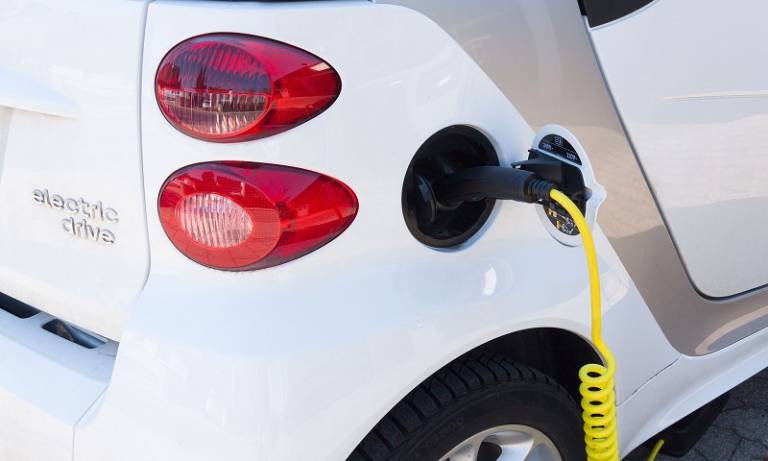PhD Studentship in development strategies for electric mobility: a techno-economic approach
14 July 2017
UCL ISR invites applications for a fully funded 4-year PhD studentship in development strategies for electric mobility: a techno-economic approach

The UCL Institute for Sustainable Resources invites applications for a fully funded (UK/EU fees plus stipend) 4-year PhD studentship funded by EPSRC.
General Information:
Title: Development strategies for electric mobility: a techno-economic approach
Supervisors: Dr Alvaro Calzadilla, Senior Lecturer in Macro-economic Modelling at UCL-ISR and Prof Raimund Bleischwitz, Deputy Director, Chair in Sustainable Global Resources at UCL-ISR
Stipend: approx. £16,550 & UK/EU fees & annual research budget of £1000 /yr, and you will also be able to apply for additional funding to UCL schemes to cover extra costs of training and travel
Start Day: September/October 2017
Funding Duration: 4 years
Eligibility: Candidates must be either UK residents or EU residents who have been living in the UK for 3 years prior to the course commencing. Please check EPSRC guidelines on student eligibility here: https://www.epsrc.ac.uk/skills/students/help/eligibility/
Details:
Reducing global carbon emissions to keep temperature under reasonable limits is one of the biggest challenges of our time. A world within 2 degrees of global warming requires a radical shift from a fossil fuel-based economy to a low-carbon economy. Technological innovation plays a key role in the transition towards a green economy, i.e. developing new low-carbon technologies, promoting their market development, and increasing resource efficiency along supply chains.
With the transport sector accounting for nearly one-quarter of global energy-related CO2 emissions, a more resource-efficient and less carbon-intensive mobility becomes imperative. The development of new low-carbon mobility technologies such as e-mobility may rapidly change the transport market in ways that are unexpected or game-changing. Thus, first-mover countries which come up with more efficient and new technologies should be able to benefit from such disruptive innovation, experiencing higher production, trade and income. International market development will be crucial too.
In your PhD you will be expected to introduce a state-of-the-art representation of technological innovation in the Environmental Global Applied General Equilibrium (ENGAGE) model of UCL-ISR. This implies mastering, combining and modelling a broad range of innovation theories. Special attention will be given to disruptive innovation related to e-mobility, batteries, components and transportation in general. This requires accounting for engineering-based information on inputs and cost structure of key technologies. The technology-based approach in conjunction with the economic model allow to represent detailed engineering characteristics of key technologies within an economy-wide perspective, making it also possible to address policy support schemes at the national/regional level without compromising the richness of the technological aspects of the e-mobility industry.
To undertake this research you are required to apply advanced computational techniques to solve large systems of simultaneous equations, which involves a meticulous compilation and analysis of global data. You are expected to represent this research area within the interdisciplinary UCL ISR macro-economic modelling team and contribute to our research strategy.
This research project will give you the opportunity to conduct cutting-edge research on modelling, representing the process by which investments in innovation lead to the development of new technologies, which disseminates across sectors and may generate new comparative advantages. Additionally, you will closely interact with professionals from other disciplines to accurately represent conventional and electric mobility in the model. This research project will allow you to investigate a wide range of development strategies to foster e-mobility. For instance, you will be able to assess the economic costs and benefits of different policies that enable an efficient and cost-effective shift to a low-carbon mobility transition.
Person Specification:
- Passionate about data analysis, modelling, programming and conducting research
- A MSc degree in engineering, economics, statistics or other data analysis discipline, e.g. machine learning
- Experience in technology innovation, possibly related to transportation or e-mobility
- Interest in the environmental, energy, economic and climate debates and policies
- Knowledge of relevant programming languages
- Ability to represent current policy issues in a formal mathematical framework
- Ability to understand complex economic relationships, interpret the results of policy simulations and clearly communicate the results to a non-scientific audience
- Ability to use own initiative and prioritise workload
- Good interpersonal and communication skills (oral and written)
- A high level of attention to detail in working methods
Application procedure:
A two-stage application procedure is in place.
Stage 1. Pre-application documents - (1) CV, (2) academic transcripts, and (3) 1-page personal statement outlining motivation, interest and eligibility for the post - should be emailed directly to Mae Oroszlany (e.oroszlany@ucl.ac.uk) and Dr Alvaro Calzadilla (a.calzadilla@ucl.ac.uk).
Stage 2. Following the interview, the successful candidate will be invited to make a formal application to the UCL Research Degree programme. Further guidance will be provided.
Any offer made will be subject to references and proof of meeting the UCL English language requirements
Informal enquiries on the content of the research topic should be emailed to Dr Alvaro Calzadilla (a.calzadilla@ucl.ac.uk)
Deadline for application: 23 July 2017
Interviews week starting: TBC
 Close
Close

